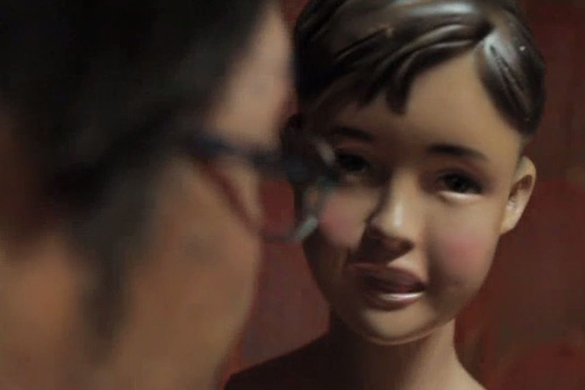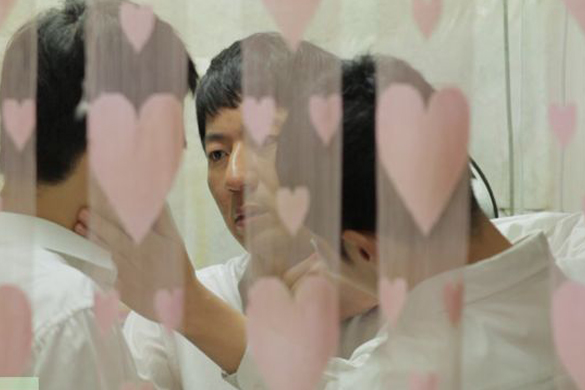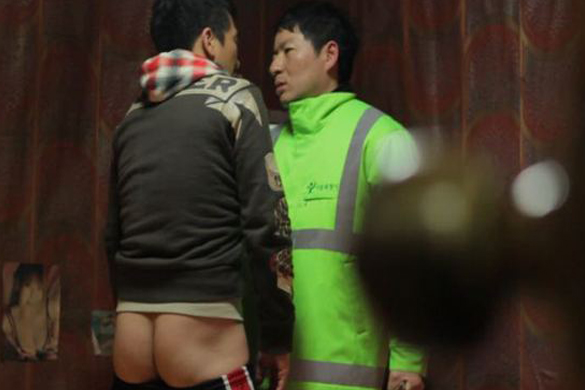"This is an old chicken, it doesn’t taste good…Once you taste the young, you would never want an old chicken…
Do they sell young chicks in this town?"
Synopsis:
Sang-woo (played by director Lee Sang-woo, himself) is a street sweeper, employed to clear the city of the almost endless trash that is a wholly unwelcome by-product of modern life and indeed present-day society.
While one would naturally assume that keeping the streets clean is just his way of earning money and his day-to-day proximity to detritus is only related to his job, however, trash - of an equally pervasive but altogether more perversive and insidious nature - is an inherent, and again unwelcome, part of Sang-woo's private life, too. For, Sang-woo's entire family - his father and both his brothers - are not only guilty of past and/or current sexual crimes but also have no qualms or hesitation about continuing their depraved activities in the future; the illegality of their plans and actions being far more a draw than a deterrent.
With his father (Kwon Bum-taek) - currently serving a ten-year sentence for the rape and torture of an eight-year-old schoolgirl - about to be released from prison, Sang-woo's personal focus quickly becomes not only preventing him from indulging in his wanton and twisted desires; ensuring that his easily led brother, Sang-tae (Yang Myung-hun), is not dragged further into depravity by associating with him; but also attempting to stop his other sibling, Sang-hu (Park Hyung-bin), from violently inflicting his homosexual wants on unwilling victims; and ultimately finding a way of (again) keeping the streets clear of yet more trash... That is, the trash that is his entire immediate family...
Review:
We are first introduced to Sang-woo in the opening scene of 'I am Trash' as he undertakes his street sweeping job while a group of schoolboys begin to kick some of the rubbish he is attempting to collect around like a football. On berating the youths, Sang-woo is physically tackled, brought crashing to the ground and mercilessly kicked and beaten for his troubles leading the audience (or certainly this reviewer, at least) to assume that the narrative about to unfold will likely be standard 'wayward youth' fare. However, such a misconception is fleeting and no sooner do we hear the first dialogue interaction between Sang-woo and his brother Sang-tae on the former's return home in the second scene (on entering his home, Sang-woo finds Sang-tae lounging seemingly dejectedly in bed and instantly admonishes him by saying "Did you masturbate? I don't see any tissues! How do you ever expect to last with a woman if you don't practice every day?") than we realise 'I am Trash' is a much darker, far more twisted and indeed both nuanced and intricate affair.
Here too, the truth of the situation is for a time withheld - Sang-woo making a concerted effort to ensure his brother is always sexually spent; thereby hopefully negating the young man's desire (or self-perceived 'need') to accost, abduct and sexually defile random vulnerable women in the city - but referencing such a strikingly unexpected statement so early on in proceedings puts the almost passing moment firmly in viewers' minds (whether they realise it or not) and thus director Lee Sang-woo deftly secures understanding of character Sang-woo's later efforts to get legal sexual gratification for his brother, without the need for fake or forced exposition.
Similarly, the story of Sang-woo's father is clearly referenced before the character ever appears (the father of his last victim seen waiting outside Sang-woo's home and saying that he'll kill the 'animal' should he dare show his face); thereby allowing us to be fairly sure of both what he's done, and indeed what his disgraceful sexual preferences are, without needing to be told outright with pace destroying explanation.
As such, as the father's individual story unfolds, director Lee Sang-woo can concentrate on the depravity of the man's wants and the unapologetic, unreformed and unrepentant nature of his twisted desires (most noticeably by means of his gleeful statement about the taste of 'young chicken'; and the sexual act - as well as the deeply uncomfortable dance - he performs with an armless mannequin of a smiling female child, complete with (hairless) genitals drawn on its body with indelible marker) perfectly underlines his unquestionably evil nature far in advance of the utterly shocking actions he's long been planning blasting their way onto the screen.
 |
The one story thread that differs from the above in order of depiction is that of Sang-woo's younger brother, private soldier Sang-hu:
In his case, his sexual crimes - and their consequences - begin to be detailed before we are even aware of who he is but, as such, they serve to point to the sheer darkness inherent to 'I am Trash' from the early stages and ease viewers in, as much as can be done, to the numerous and even more jaw-droppingly shocking themes, threads and character arcs that will come to the fore as the narrative unfolds.
Make no mistake; this film is not an easy watch in any respect, shape or form. However, not only is its story utterly warranted when you consider the final conclusion of the tale - in comparison to a large number of other recent Korean films detailing sexual crimes and depravity (more on this shortly) - but, to my mind, 'I am Trash' is ultimately one of the most important Korean films to emerge in quite some time; a hard-hitting film with an ultimate statement that has been long needed by Korean cinema as a whole:
 |
The placing, nature and reason for the appearance of sexuality and sexual themes within Korean film narratives have changed almost beyond recognition since their initial emergence - from sex, seductresses and base instincts being a threat to society in Golden Age narratives; to the later perceived (and continued) importance of female pre-marital pureness and chastity in the years that saw Korean woman gradually beginning to see themselves as individuals in their own right; to the more recent tales of depraved killers facing less than severe punishment for their crimes; to altogether more balanced depictions of male/female sexually aware young adults; etc etc - but while this increasing sexual openness in Korean cinematic content is certainly mostly a positive step forward there is without question a downside:
If we take as an example last year's Jeonju International Film Festival, there were a number of (male helmed) films premiered that were, to my mind, misogynistic and sexually abusive to an utterly offensive level to the extent that I for a time felt an unshakeable need to either access some female directed films showing female retribution for atrocities committed against them or indeed temporarily step away entirely to far gentler content.
Of course, the claim of misogynism rearing its head in Korean cinema is nothing new (for years Kim Ki-duk, for example, faced almost endless criticism in relation to the issue) but the recent films referenced above have (sadly in a number of cases) taken female abuse and sexual degradation to a completely new and, in my opinion, wholly unacceptable level without any real reference to justice or consequence at the end of the day.
With that in mind, the importance of 'I am Trash' frankly cannot be overstated and though it is a hard-hitting and difficult to watch as almost any film you care to mention, its ultimate outcome serves as a catharsis of sorts and screams of something extreme desperately needing to be done to combat sexual crimes against the innocent. While Sang-woo's decision of how to clear the streets of his family's depravity could never be condoned in society or in reality, I ultimately find it impossible to think anything other than "the character did the right thing and in fact the only thing he could do".
 |
As a final note, I did for a time question of Sang-woo's character being the singular polar opposite of the rest of his depraved kin but there is one scene in which he inflicts an injury on himself and, though it's just conjecture on my part, I can't help but feel the same question occurred to him; his chosen action in that scene essentially being him taking the law into his own hands, so to speak, for exactly that reason or fear of it and circumventing any chance of him following in their footsteps, in the process.
Summary:
'I am Trash' is as hard-hitting and shocking as almost any Korean film in recent memory but it's importance cannot be overstated and while its character outcome could never be condoned in reality, its ultimate statement loudly screams of severe punishment sorely being needed in society for extreme sexual crimes.
'I am Trash' (나는 쓰레기다) / 2014 / written and directed by Lee Sang-woo
|





